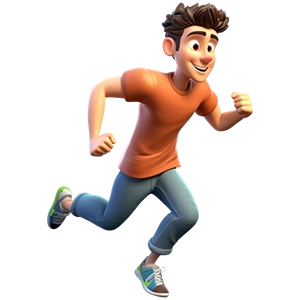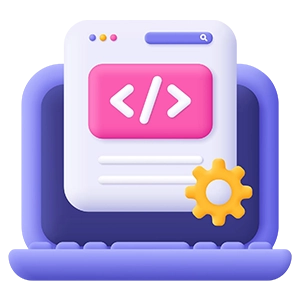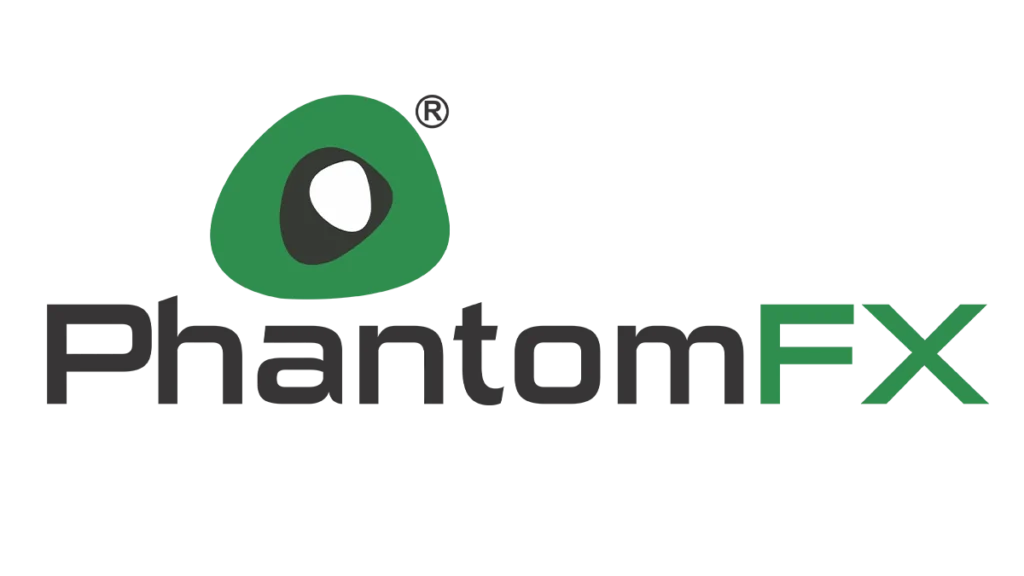No products in the cart.
Return To Shop
Trusted Since 2007 · Admissions Open 2026
VFX Course in Chennai Become a Certified Visual Effects Artist
Join Chennai's best VFX institute with a proven 24-year legacy. Master industry-standard tools like Nuke, Houdini, Maya & Unreal Engine through hands-on live projects. Our 12-month professional VFX course comes with 100% placement support – preparing you for a high-demand career in film, TV & gaming.
⭐⭐⭐⭐⭐
4.8/5
🎓 23+ Years of VFX Training Excellence
✅ 100% Placement Support
🎯 15+ Industry Tools
🏆 2000+ VFX Artists Trained
🎬 20+ Live Film Projects
📜 Recognized Across 30+ Countries for Superior Standards
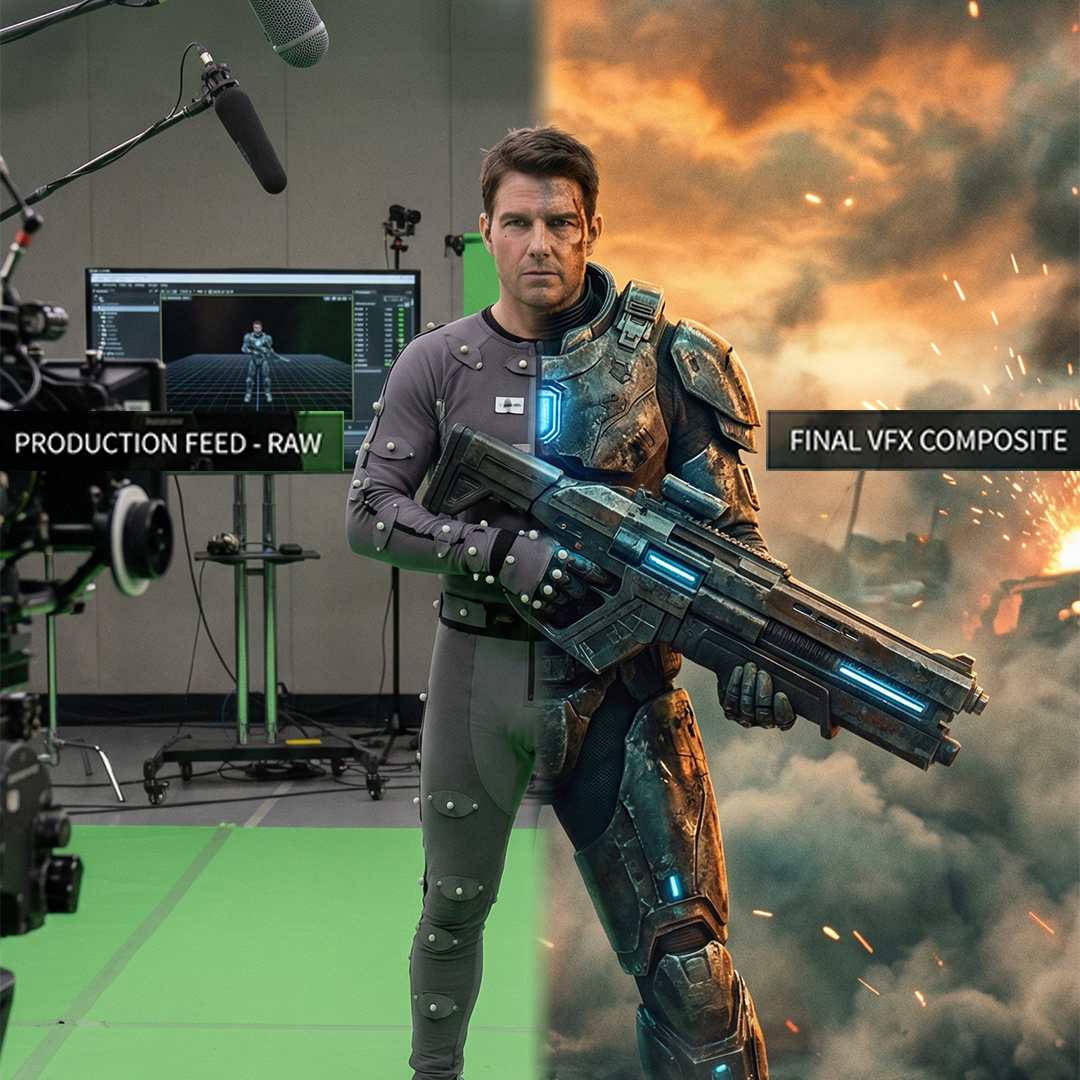
🎥
Pro Chromatic Studio Green Chroma Studio Setup
💼
40+ Hiring Partners
🤖
AI-Powered VFX Workflows Included
⭐
4.8 / 5 Student Rating ⭐⭐⭐⭐⭐
📚
17 +
Course Modules Comprehensive Syllabus 🛠️
15 +
Industry Tools Nuke · Houdini · Maya 🎯
100 %
Placement Support Career Guaranteed ⏱️
12 Months
Course Duration Weekday & Weekend
About Visual Effects
What Is VFX (Visual Effects)?
VFX (Visual Effects) refers to the creation or manipulation of imagery outside the context of a live-action shot — blending real footage with computer-generated elements to create scenes that would be impossible, expensive, or dangerous to film in reality. Enrolling in a professional VFX course gives you the skills to bring these cinematic visions to life.
From Marvel blockbusters to Netflix originals, VFX is the invisible art that makes modern storytelling possible. It powers everything from explosive action sequences and fantasy worlds to subtle beauty fixes and environment extensions you never notice. This is exactly why the VFX career scope in India continues to expand year after year.
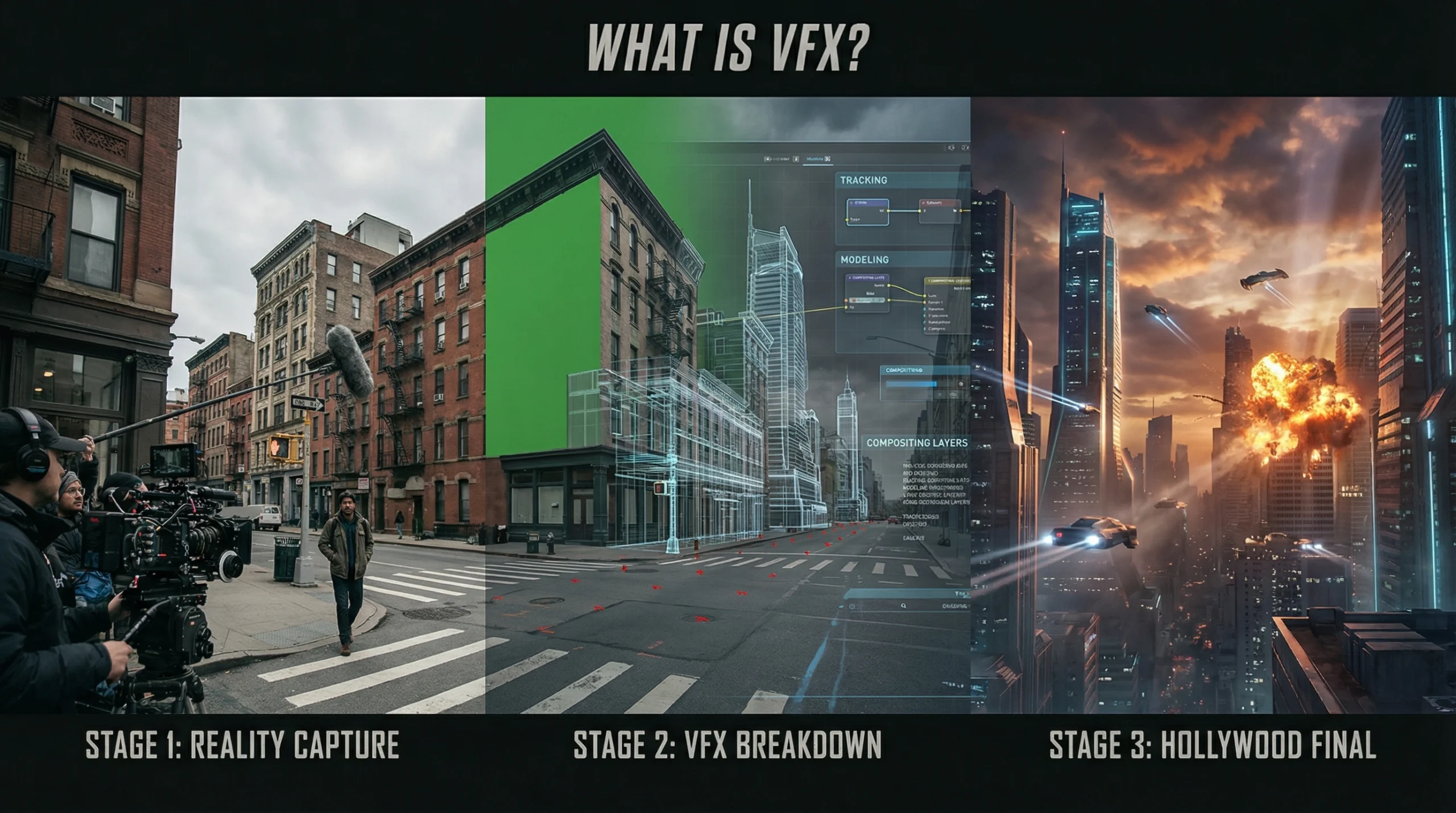
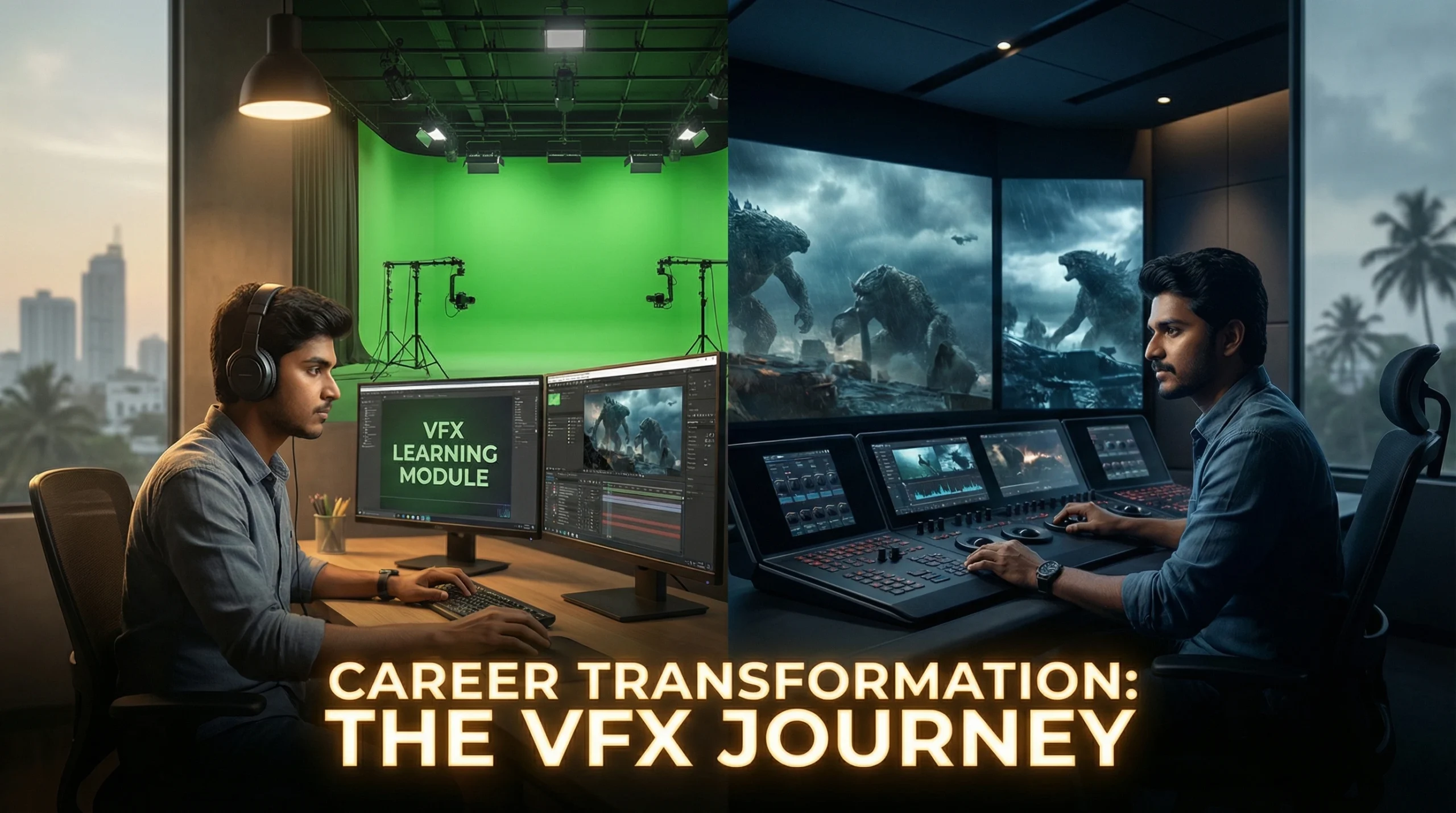
Why Is a Visual Effects Course in Chennai a Game Changer for Your Career?
India's VFX industry is projected to reach ₹18,400 crore by 2027 (FICCI report), creating thousands of high-paying jobs in Chennai and across the country. With studios like DNEG, Prime Focus, and Technicolor actively hiring, now is the perfect time to enroll in a VFX course in Chennai and master this craft.
💰
₹4L – ₹40L+ VFX Artist Salary in India
📈
29% Growth Industry Growth 2024
🎯
₹18,400 Cr Market Size by 2027
Why Learn VFX in 2026
Why a VFX Course in Chennai Is Your Gateway to a Thriving Creative Career
Learning visual effects opens doors to a world of creativity, innovation, and high-demand career opportunities across film, gaming, advertising, and beyond.
🎬
Unlimited Creative Possibilities
Bring any world, creature, or effect to life — from sci-fi landscapes to hyper-realistic explosions. With advanced VFX training, your imagination becomes the only limit. Our compositing course in Chennai teaches you to seamlessly blend CG with live action.
💼
High-Demand, High-Paying Career
The average VFX artist salary in India ranges from ₹4L to ₹40L+ per year depending on specialization. With streaming platforms booming globally, the demand for skilled VFX professionals has never been higher — making the VFX career scope in India 2026 incredibly promising.
🌍
Work Across Industries & Freelance
VFX skills apply to film, TV, gaming, advertising, architecture, VR/AR, and streaming — giving you a versatile, future-proof career. Many of our graduates explore VFX freelancing opportunities with ad agencies and OTT platforms, earning ₹40K–₹80K/month independently.
🤖
AI-Powered Future of VFX
AI is revolutionizing VFX workflows across the industry. Our advanced VFX training covers cutting-edge tools like Runway ML, Adobe Firefly & Midjourney — ensuring you stay ahead of the curve and remain competitive in the evolving visual effects landscape.
💡
India's VFX & Animation industry grew 29% in 2024 (FICCI-EY Report), with Chennai emerging as a major VFX hub. Studios like DNEG, MPC, Framestore and Prime Focus are actively hiring trained VFX artists — this is the ideal time to invest in a professional visual effects course. Check our course fees and batch details to get started.
Course Details
VFX Course Duration & Eligibility
Our industry-focused curriculum is designed to take you from a beginner to a studio-ready artist. Focus on practical skills, portfolio building, and real-world workflows.
⏱️
Program Duration
12 Months (Intensive Training)
Includes Internship & Portfolio🎓
Who Can Apply?
10th/12th Pass, Graduates (Any Stream), or Working Professionals.
No prior creative experience required.
💻
Learning Modes
Classroom & Online (Hybrid options available)
Weekdays (Mon-Fri) or Weekends (Sat-Sun)
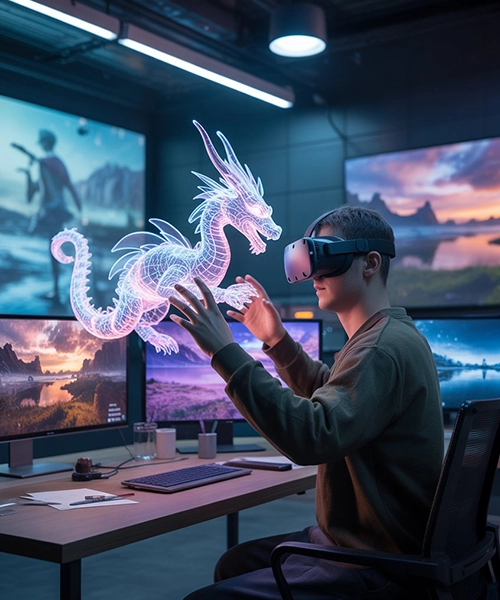
🚀
Job-Ready In 1 Year
Why Learn VFX in 2026
Why a VFX Course in Chennai Can Transform Your Career
From high salaries to global freelancing opportunities — discover why visual effects is one of the most rewarding creative careers you can pursue today.
VFX Artist Salary in India — What Can You Really Earn?
The VFX artist salary in India varies based on your specialization, experience, and the studio you work for. Freshers starting from a reputable VFX institute in Chennai typically earn ₹3–₹6 LPA, while mid-level compositors and FX artists command ₹8–₹18 LPA.
Senior VFX supervisors and leads at top studios like DNEG, MPC, Framestore, and Prime Focus earn ₹20–₹40 LPA or more. International remote positions can pay even higher — making VFX one of the highest-paying creative careers in India.
- Junior Compositor (Nuke): ₹3–₹6 LPA
- Mid-Level FX Artist (Houdini): ₹8–₹18 LPA
- Senior VFX Supervisor: ₹20–₹40+ LPA
- Freelance VFX (International): $40–$80/hr
💰
₹40L+
Senior VFX Artist Salary
📈
29%
Industry Growth in 2024
"India's VFX industry salaries have doubled in the last 5 years, driven by global outsourcing and OTT platform demand."
— FICCI-EY Media Report 2024VFX Career Scope in India 2026 — A Booming Industry
The VFX career scope in India has never been stronger. With the rise of OTT platforms like Netflix, Amazon Prime, and Disney+ Hotstar, Indian studios are producing more VFX-heavy content than ever before. This has led to a massive demand for skilled visual effects artists across the country.
Chennai is emerging as a top VFX hub, with studios expanding operations and actively recruiting graduates from leading VFX institutes in Chennai. Career paths include compositing, FX simulation, matte painting, 3D modeling, virtual production, and VFX supervision.
- Compositor — Nuke, After Effects specialists
- FX Artist — Houdini simulations (fire, water, destruction)
- Matte Painter — Environment creation & set extensions
- 3D Generalist — Modeling, texturing, lighting
- VFX Supervisor — On-set & post-production leadership
- Virtual Production TD — Unreal Engine & LED volume
🎯
₹18,400 Cr
Indian VFX Market by 2027
🏢
50+
Studios Hiring in Chennai
"Chennai has become India's third-largest VFX production hub after Mumbai and Hyderabad, with major studios setting up operations."
— NASSCOM Industry ReportVFX Freelancing Opportunities — Work from Anywhere
One of the biggest advantages of learning VFX is the VFX freelancing opportunities it unlocks. Unlike many careers, visual effects work can be done remotely — allowing you to collaborate with studios and agencies worldwide from the comfort of your home in Chennai.
Freelance VFX artists typically earn ₹40K–₹1.5L per month working on ad films, music videos, corporate content, and indie projects. International clients on platforms like Upwork and Fiverr pay $40–$80/hr for skilled Nuke compositors and Houdini FX artists.
- Ad Films & Commercials: ₹15K–₹1L per project
- YouTube/OTT Content: Steady recurring work
- International Remote: $40–$80/hr (Nuke/Houdini)
- Wedding & Event VFX: Growing niche market
- Gaming & AR/VR: Real-time VFX projects
🌍
$80/hr
Top Freelance VFX Rate
🏠
100%
Remote Work Possible
"Post-pandemic, over 60% of VFX work in India is now done remotely, opening up international freelancing opportunities for Indian artists."
— VFX Industry Survey 2024Global VFX Industry Demand — Why Studios Can't Hire Fast Enough
The global VFX industry is experiencing unprecedented demand. Every major film, TV series, and streaming original now relies heavily on visual effects. Studios like DNEG, Framestore, ILM, and Weta Digital are constantly expanding their teams — and India is at the center of this growth.
With India's VFX & animation industry growing 29% in 2024 (FICCI-EY Report), the gap between available positions and qualified artists continues to widen. Graduates from an advanced VFX training program with Nuke, Houdini, and compositing skills are among the most sought-after professionals.
- DNEG India — 3,000+ artists, actively hiring
- Prime Focus / DNEG — India's largest VFX studio
- Technicolor India — Chennai & Bangalore operations
- MPC (Moving Picture Company) — Bangalore hub
- Bot VFX, Phantom FX — Growing Chennai studios
🎬
3,000+
VFX Job Openings Monthly
🌐
40%
Global VFX Done in India
"India now handles nearly 40% of the world's outsourced VFX work, making it the largest VFX outsourcing hub globally."
— Deloitte Media Report 2024AI in VFX — The Future of Visual Effects Is Here
AI is revolutionizing VFX workflows, not replacing artists — but supercharging their productivity. From automated rotoscoping and AI-powered cleanup to intelligent compositing and procedural environment generation, the VFX artists of tomorrow need to master both traditional techniques and AI tools.
Our advanced VFX training in Chennai includes dedicated modules on AI-assisted workflows using tools like Runway ML, Adobe Firefly, and Midjourney — ensuring our graduates stay ahead of the industry curve and remain competitive.
- AI Rotoscoping: 10x faster than manual roto
- AI Compositing: Smart edge detection & cleanup
- AI Environment Gen: Rapid concept & matte painting
- AI Motion Capture: Markerless body/face tracking
- Neural Rendering: Real-time path tracing with AI
🤖
10x
Faster with AI Tools
🚀
85%
Studios Adopting AI by 2026
"Artists who combine traditional VFX skills with AI proficiency will be the most valuable hires in the next 5 years."
— fxguide Industry Forecast 2025Ready to launch your career in visual effects? Join Chennai's most comprehensive VFX course with 100% placement support.
Start Your VFX Journey Today →
Experience Our Infrastructure
Studio-Style Learning With VFX
At VFX, your ideas don't stay on paper — they come alive. Train in a real production studio environment built for professional VFX course training in Chennai.
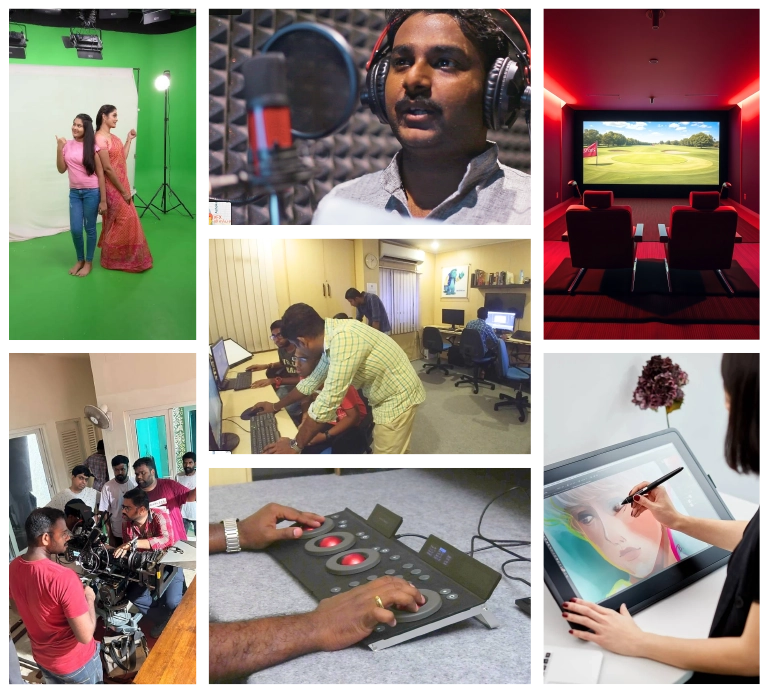
23+ Years Industry Experience
👥
Small Batch, Big Impact
Batch sizes limited to 15 students max to ensure every student gets
dedicated 1-on-1 attention and mentorship.
🎬
Real Studio Instructors
Learn from mentors who've worked at actual VFX studios and agencies : not
just theory teachers, but production veterans.
🕐
24/7 Student Support
Round-the-clock access to mentoring, career guidance, and project feedback
: because creative breakthroughs don't follow office hours.
🚀
2026-Ready Syllabus
Curriculum updated every cycle to align with current industry trends,
including AI-assisted VFX, virtual production, and real-time compositing.
From Creative Briefs to Production-Ready Shots
Step into the professional world of visual effects with a course designed around real industry workflows. From interpreting briefs to delivering production-ready VFX shots : with live mentor feedback, peer critiques, and hands-on guidance at every stage.
Industry-Standard Training
Professional Visual Effects Course
Step into high-end visual storytelling. Our Professional VFX Course bridges the gap between creative ambition and studio reality. Master the core artistic principles and production workflows used in blockbuster filmmaking today.
View Detailed Syllabus →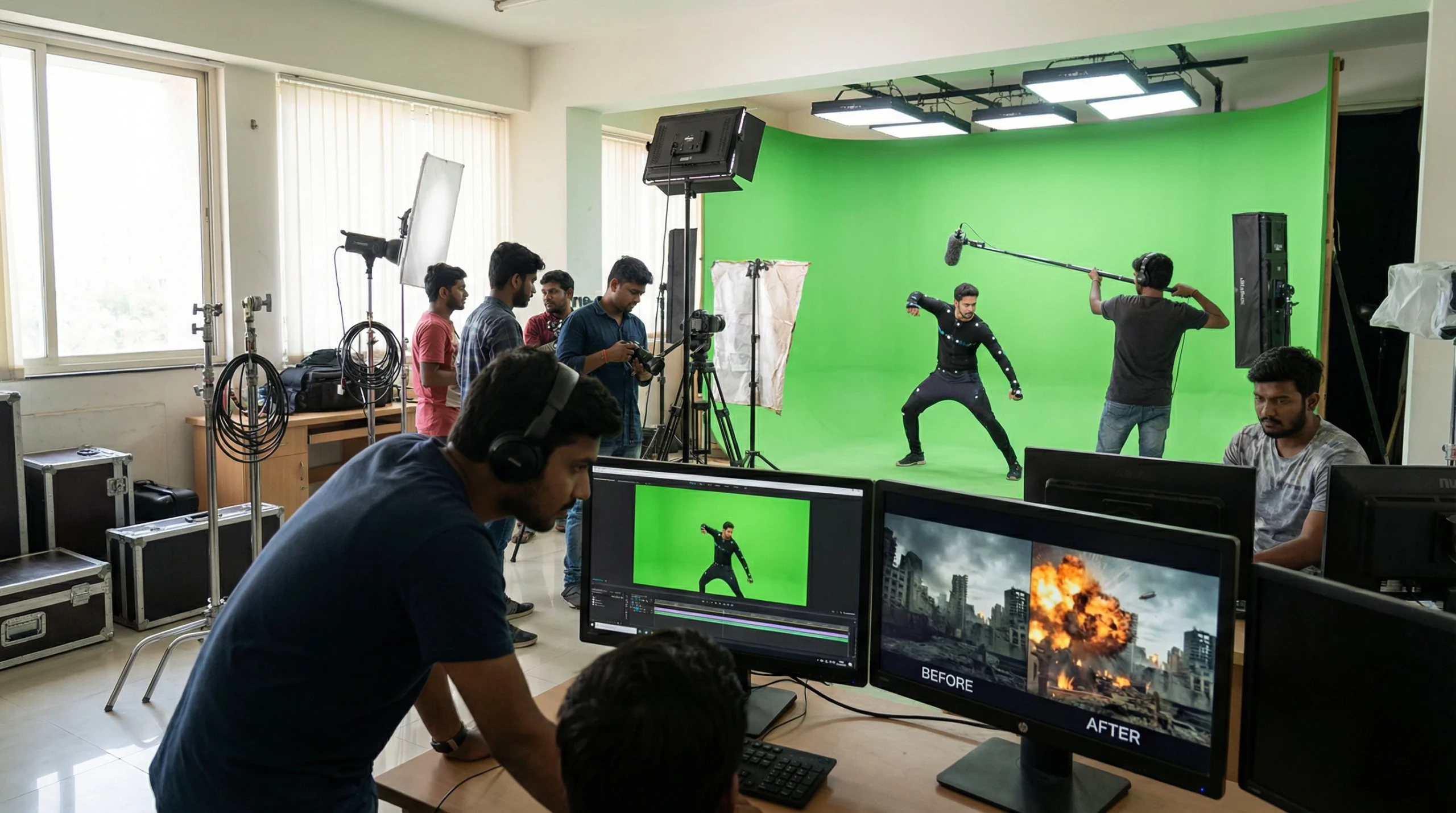
Course Curriculum
VFX Course Syllabus
Your Learning Roadmap
Our professional VFX course in Chennai is structured as a progressive 17-module journey — from fundamentals to an industry-ready capstone portfolio, covering every skill modern studios demand.
12 Months Duration
17 Modules
18+ Industry Tools
Phase 1 — Foundation & Pipeline
Module : 01 - VFX Foundations & Production Pipeline
- Roles, departments & shot lifecycle (Pre-Prod → On-Set → Post → Delivery)
- File/shot naming, versioning, color management (sRGB/Rec.709/ACES), OCIO basics
- Plate formats, bit depth, compression, EXR management; render passes & AOVs
- Planning a shot: Brief → Bid → Previs → Techvis → Schedule → Review cycles
Nuke DaVinci Resolve Frame.io
01
02
Module : 02 - On-Set Data & Ingest
- Plate acquisition best practices: camera settings, lens data, slate/metadata
- HDRI/gray-ball/chrome-ball capture, witness cams, survey & measurements
- Lens grids, distortion/undistortion workflow; managing LUTs
3D Equalizer Nuke
Module : 03 - Compositing Fundamentals
- Node vs layer paradigms; transforms, premult/unpremult, color pipeline
- Channels & mattes (RGBA/Alpha/Z/Utility); grain, defocus, regraining
- Keying overview (luma/chroma), spill suppression, edge integration
Nuke After Effects
03
Phase 2 — Core Compositing & Tracking
04
Module : 04 - Roto, Paint & Cleanup
- Production roto: shapes, motion blur handling, edge fidelity, hair/soft edges
- Paint & cleanup: rig/wire removal, plate reconstruction, patching & grain match
- Stereo roto/paint considerations
Nuke Silhouette FX Mocha Pro
Module : 05 - Tracking, Matchmove & Stabilization
- 2D tracking (point/planar) for screens, signs, patches
- Advanced planar tracking, mesh warps, power-matte workflows
- Full 3D camera/scene solve, object tracks, lens distortion workflows
3D Equalizer Mocha Pro Nuke
05
06
Module : 06 - Keying & Screen Replacements
- Green/blue screen best practices; multi-key set-ups; despill & edge blend
- Fine detail recovery (hair, glass, motion blur), light-wrap, IBK/Keylight
- Screen inserts: reflections, moiré, rolling-shutter & flicker fixes
Nuke After Effects
Module : 07 - CG Integration for Live Action
- Multi-pass compositing: beauty, diffuse, specular, SSS, emission, shadow, AO, cryptomatte
- Relighting with normals/position passes; contact shadows; fog/atmosphere integration
- Depth workflows (Z-defocus, edge artifacts, holdouts), projections/3D cards
Nuke Blender
07
🎬 Milestone — First Complete Comp Shot
Phase 3 — 3D, FX & Creature VFX
08
Module : 08 - 3D Modeling, Lookdev & Texturing
- Asset ingestion vs hero build; topology for film; UDIM workflows
- Texture authoring (albedo/rough/metal/normal/displacement), baking maps
- Lookdev/preview, matching plate lighting & camera response
ZBrush Substance 3D Blender
Module : 09 - Lighting, Rendering & Optimization
- Physical lighting concepts, HDRI & image-based lighting, shadowing strategies
- Render engines overview (Cycles/Arnold/path-tracers), sampling, denoising, AOV planning
- Render optimization for comps: bit depth, compression, tiled EXR, crypto workflows
Blender Nuke
09
10
Module : 10 - Houdini FX: Particles, Pyro, Fluids & Destruction
- Proceduralism mindset (SOPs/VEX); particle/instancing setups
- Pyro sims (smoke, fire, explosions), FLIP fluids (water), Vellum (cloth/soft bodies)
- RBD destruction, caching/partitioning, export for comp/UE
Houdini
Module : 11 - Creature & Character VFX
- Scan/kitbash → sculpt → retopo → texture → groom overview
- Fur/hair basics, muscle/fat jiggle passes, eye/teeth integration in comp
- Face/limb replacements; cleanup of mocap/retargeting artifacts
ZBrush Houdini Nuke
11
Phase 4 — Advanced, Virtual Production & AI
12
Module : 12 - Virtual Production & Real-Time VFX
- VP pipeline: previs → LED wall workflows → camera sync → nDisplay basics
- Real-time set extensions, ICVFX color pipeline & latency considerations
- Importing Houdini/Blender caches; Niagara/VFX Graph overview
Unreal Engine Houdini
Module : 13 - Matte Painting & Environment Creation
- Concept → photobash → paint; perspective, parallax & scale cues
- 2.5D/3D camera projections; atmospherics, god-rays, volumetric tricks
- Sky/terrain replacement, city/building set-extensions
Photoshop Nuke Blender
13
14
Module : 14 - Color, Lookdev & Finishing
- Matching plates to CG (exposure, white point, gamut), show LUTs
- ACES best practices; beauty vs "neutral" comps; delivery specs
- Sharpening, film response, grain/defocus continuity; QC checklists
DaVinci Resolve Nuke
Module : 15 - AI-Assisted VFX Workflows
- AI roto, cleanup & inpainting; motion interpolation & upscaling
- AI concepting & environment ideation; procedural textures/sky swaps
- AI mocap, style transfer & shot-specific augmentation ethics & approvals
Runway ML Adobe Firefly Midjourney
15
🎨 Milestone — Demo Reel Ready
Phase 5 — Capstone & Career Launch
16
Module : 16 - Audio for VFX, Editorial & Collaboration
- Temp sound & timing for reels; dialogue clean-up basics for spot comps
- Editorial turnovers, conform, EDL/AAF/XML, sync to picture
- Asset/shot tracking, notes & turnover etiquette; dailies culture
- Version control, shot packaging, publish conventions; remote collaboration
Pro Tools Frame.io DaVinci Resolve
Module : 17 - Capstone Production & Professional Portfolio Creation
- Brief to delivery on multi-shot sequence (live-action + CG + FX + comp)
- Peer/client-style reviews, notes rounds, change-list management
- Showreel strategy: breakdowns, before/after, music licensing
- Job prep & networking: resume, LinkedIn, Artstation, interview coaching
All Tools Artstation LinkedIn
17
🏆 Industry-Ready VFX Professional
Want the Full Syllabus PDF?
Download detailed module breakdown with weekly schedule & project list.
Course Structure
VFX Course Learning Path
A step-by-step roadmap designed to take you from basics to industry-ready professional in 12 months.
01
Foundation in Art & Design
Composition, Color Theory & Digital Art Basics.
02
Core Tools & Techniques
Photoshop, After Effects & Motion Graphics.
03
Advanced Compositing
Nuke Roto, Paint, Keying & Deep Comp.
04
3D & Real-time Integration
Maya CGI Matchmove & Unreal Engine.
05
FX Simulation & Dynamics
Houdini Fire, Smoke, Water & Destruction.
06
Portfolio & Placement
Demo Reel, Interviews & Studio Job.
VFX Software Training 2026
Master 18+ Pro VFX Tools Used by Global Studios
Our VFX course in Chennai trains you on the exact software stack that studios like DNEG, Framestore, and MPC use daily — from Nuke compositing and Houdini FX to AI-assisted VFX workflows.
 Compositing
Compositing Industry-standard node-based compositing for film &
TV
VFX pipelines
Used in Modules 1–7, 14  Compositing
Compositing Motion graphics, layer compositing & broadcast VFX
workflows
Used in Modules 3, 6  FX & Simulation
FX & Simulation Pyro, fluids, destruction & procedural FX simulations
for
films
Used in Modules 10, 12  3D & Modeling
3D & Modeling 3D modeling, lighting, rendering & open-source
animation
suite
Used in Modules 7–9, 13  3D & Modeling
3D & Modeling Digital sculpting for creatures, characters & asset
detailing
Used in Modules 8, 11  3D & Modeling
3D & Modeling PBR texture authoring & material design for
film-quality
assets
Used in Module 8  Real-Time & VP
Real-Time & VP Real-time rendering, LED wall filmmaking & virtual
production workflows
Used in Module 12  Color & Finishing
Color & Finishing Professional color grading, conform & editorial
finishing
Used in Modules 1, 14, 16  Compositing
Compositing Production roto, paint & cleanup for feature film
pipelines
Used in Module 4  Matte Painting
Matte Painting Matte painting, photobashing, concepts & texture
creation
Used in Module 13  AI-Assisted VFX
AI-Assisted VFX AI video editing, inpainting & generative VFX
automation
Used in Module 15  AI-Assisted VFX
AI-Assisted VFX Commercially-safe AI for textures, backgrounds &
style
transfer
Used in Module 15  AI-Assisted VFX
AI-Assisted VFX AI concepting, environment ideation & visual research
tools
Used in Module 15 Cloud review & collaboration for shot notes &
team
workflows
Used in Modules 1, 16 Temp sound, dialogue sync & editorial turnovers for
VFX
reels
Used in Module 16  Compositing
Compositing Nuke
Industry-standard node-based compositing for film &
TV
VFX pipelines
Used in Modules 1–7, 14  Compositing
Compositing After Effects
Motion graphics, layer compositing & broadcast VFX
workflows
Used in Modules 3, 6  FX & Simulation
FX & Simulation Houdini
Pyro, fluids, destruction & procedural FX simulations
for
films
Used in Modules 10, 12  3D & Modeling
3D & Modeling Blender
3D modeling, lighting, rendering & open-source
animation
suite
Used in Modules 7–9, 13  3D & Modeling
3D & Modeling ZBrush
Digital sculpting for creatures, characters & asset
detailing
Used in Modules 8, 11  3D & Modeling
3D & Modeling Substance 3D
PBR texture authoring & material design for
film-quality
assets
Used in Module 8  Real-Time & VP
Real-Time & VP Unreal Engine
Real-time rendering, LED wall filmmaking & virtual
production workflows
Used in Module 12  Color & Finishing
Color & Finishing DaVinci Resolve
Professional color grading, conform & editorial
finishing
Used in Modules 1, 14, 16 3D Equalizer
Premium camera tracking & 3D matchmove for feature
films
Used in Modules 2, 5  Tracking
Tracking Mocha Pro
Planar tracking, advanced roto & object removal tools
Used in Modules 4, 5  Compositing
Compositing Silhouette FX
Production roto, paint & cleanup for feature film
pipelines
Used in Module 4  Matte Painting
Matte Painting Photoshop
Matte painting, photobashing, concepts & texture
creation
Used in Module 13  AI-Assisted VFX
AI-Assisted VFX Runway ML
AI video editing, inpainting & generative VFX
automation
Used in Module 15  AI-Assisted VFX
AI-Assisted VFX Adobe Firefly
Commercially-safe AI for textures, backgrounds &
style
transfer
Used in Module 15  AI-Assisted VFX
AI-Assisted VFX Midjourney
AI concepting, environment ideation & visual research
tools
Used in Module 15 DeepMotion
AI-powered motion capture & body tracking for
animation
Used in Module 11 Frame.io
Cloud review & collaboration for shot notes &
team
workflows
Used in Modules 1, 16 Pro Tools
Temp sound, dialogue sync & editorial turnovers for
VFX
reels
Used in Module 16 Compositing 4
3D & Modeling 4
FX 1
Tracking 3
AI 3
Color 1
Pipeline 2
All 18+ tools taught through real VFX project workflows — the same pipeline used by professional VFX artists at top studios worldwide.
Explore Full CurriculumCareer Standard
An Industry-Recognized Certification
Your certificate is more than just paper—it’s proof of your production-ready skills. Accredited by national boards and recognized by top global studios.
🏆
ISO 9001:2015 Certified
Our curriculum meets rigorous international quality standards for vocational training.
�
Life-Time Placement Support
Valid verification key for employers to authenticate your skills instantly.
Life-time access to our alumni network and career resources.
🌍
Global Studio Acceptance
Recognized Across 30+ Countries for Superior Standards.
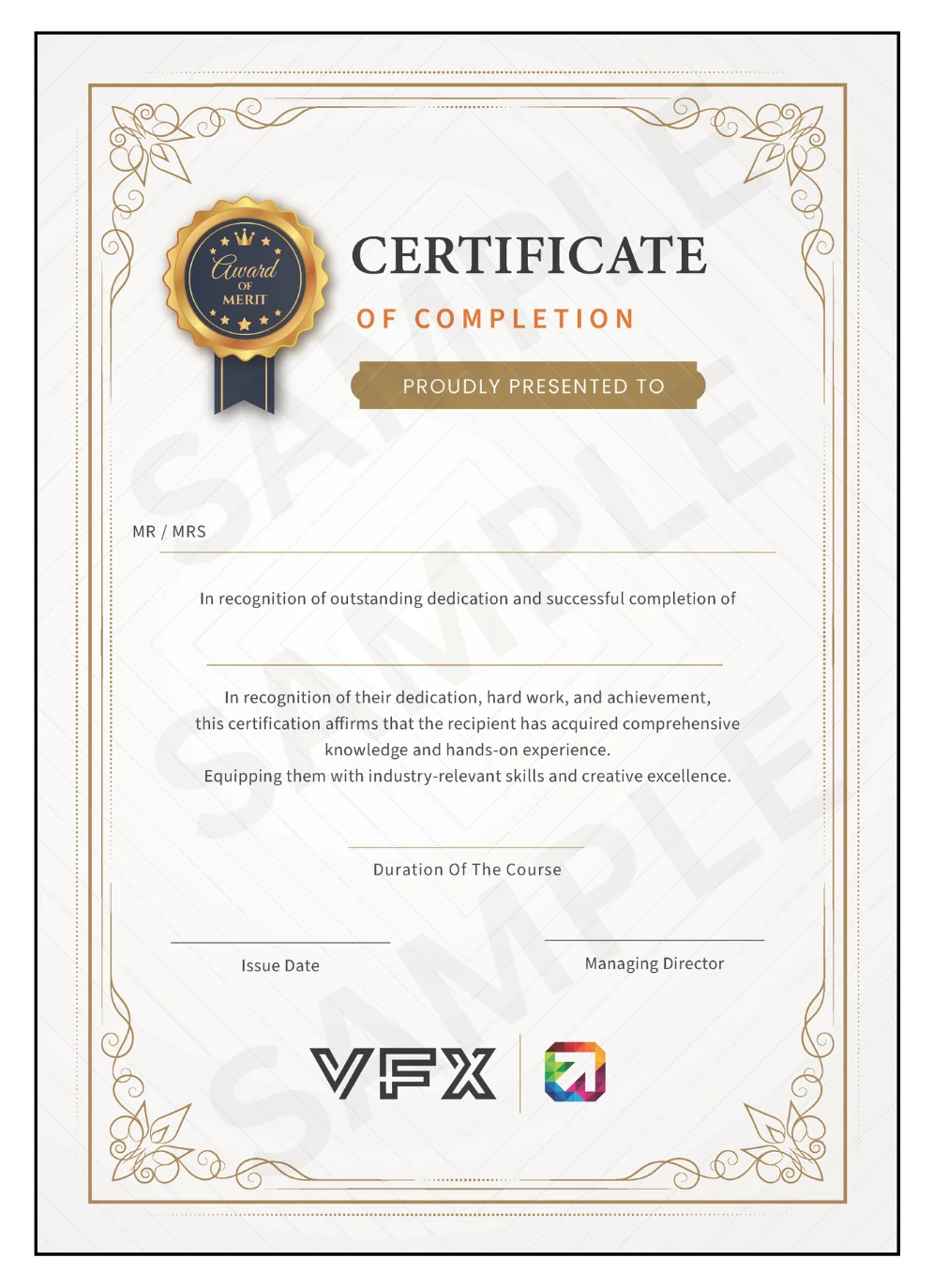
✓ NSDC Authorized
★ ISO 9001:2015
CAREER PATHWAYS
VFX Career Opportunities
Visual Effects offers diverse career paths across films, OTT platforms, advertising, gaming, and virtual production. Click on the roles below to explore responsibilities.
🎨
VFX Artist
+
Creates visual effects shots by integrating CGI, FX simulations, and live-action footage for films and digital content.
🎬
Compositing Artist
+
Combines multiple elements such as green screen footage, CGI renders, and effects into seamless final shots.
💥
FX Simulation Artist
+
Develops dynamic effects including fire, smoke, explosions, water, and particles using advanced simulation tools.
🎯
Matchmove / Tracking Artist
+
Tracks camera movement and objects from live-action footage to enable accurate CGI integration.
🖌️
Matte Painter
+
Creates realistic digital environments, backgrounds, and set extensions for films and OTT productions.
🌍
CGI Generalist
+
Handles multiple aspects of 3D production including modeling, texturing, lighting, and rendering for VFX shots.
🔧
Roto & Paint Artist
+
Performs rotoscoping, paint cleanup, and object removal to prepare plates for compositing.
🎞️
Film Post-Production Artist
+
Works across visual effects, color, and finishing stages to deliver production-ready content for cinema and streaming platforms.
Avg. Starting Salaries (LPA)
₹3.5L
🔧
Roto & Paint
Artist
Artist
₹4.0L
🎯
Matchmove
Artist
Artist
₹5.0L
🎨
VFX
Artist
Artist
₹6.0L
🎬
Compositing
Artist
Artist
₹7.0L
💥
FX Simulation
Artist
Artist
VFX Course Reviews & Placements 2026
Hear From Our Successfully Placed Alumni
Real feedback from real students who transitioned into VFX careers after completing our professional VFX course in Chennai. Their words, their journey — from our classroom to top studios worldwide.
2000+
VFX Artists Placed
92%
Placement Rate
₹4.5L+
Avg Starting Salary
40+
Hiring Partners
★★★★★
"The course completely changed my career trajectory. I went from a graphic designer
to a compositing artist within 6 months. The Nuke training was world-class."
AK
Aravind Kumar
Compositor
Nuke Mocha Compositing
★★★★★
"What sets VFX apart is the real-world workflow. We didn't watch tutorials — we worked
on actual shots. My demo reel landed me an interview at Prime Focus on the first try."
PS
Priya Sundar
Roto & Paint Lead — Prime Focus
Silhouette FX Nuke Roto
★★★★★
"I quit engineering to follow my passion. The Houdini modules blew my mind — pyro, fluids,
destruction. My engineering mindset actually helped. Now I simulate explosions for Hollywood."
KR
Karthik Rajan
FX TD — BOT VFX
Houdini Nuke FX
★★★★★
"I had zero knowledge about VFX software before joining. The training didn't just teach me
tools — it moulded me into a true VFX artist. Today I supervise visual effects for leading
films."
VG
Venugopal
Visual Effects Supervisor
Nuke Compositing Supervision
★★★★★
"The faculty started grooming us for placements from day one. VFX gave me the perfect
platform to sharpen my skills and land a role at a top studio. Truly grateful for the
experience."
VK
Vijayakumar
VFX Artist — Phantom FX
Nuke Roto Paint
★★★★★
"This institute gave me more than skills — it gave me a launchpad. The supportive faculty
and hands-on projects helped me build confidence and kick-start my career in the media
industry."
NR
Narayanan
VFX Artist — Niralcube Technology
Nuke Compositing VFX
Your VFX Success Story Starts Here
Join 500+ alumni building VFX careers at India's top studios — with 100% placement support from our Chennai institute.
Student Success Stories
Watch What Our Students Create
From green screen integration to complex 3D compositing, see the industry-level outputs produced by our graduates.
Featured Showreel
Creature Creation 3D Model - Live Painting in ZBrush
Watch the Creature 3D Model Live Painting process in ZBrush, where every stroke brings this fantasy character to life with intricate textures and realistic skin details.
More Student Works

▶
Creature Creation 3D Model
3D & Sculpting • 02:45

▶
Ocean Compositing Work
Simulation & FX • 01:30

▶
Zombie Porthole Composition
Compositing • 03:15

▶
Wand Effects VFX Breakdown
Particle FX • 02:10

▶
Loki Character Rotoscoping
Rotoscopy • 01:45
Top-Tier Career Support
VFX Placement Support
Our placement process is designed to bridge the gap between training and employment. Here is how we prepare you for the industry's top studios.
01
Portfolio & Showreel
We help you build a studio-ready demo reel showcasing your best shots and breakdowns.
02
Mock Interviews
Practice technical and HR rounds with industry experts to boost your confidence.
03
Direct Referrals
Once certified, your profile is shared directly with our hiring partner network.
Meet Your VFX Mentor
SK
23+ YRS
Samputh Kumar
Lead VFX Instructor & VFX Supervisor
Training the next generation of professional VFX artists from Chennai since
2002
0
Years in VFX Industry
0
VFX Artists Trained
0
Tools Mastered
0
Projects Delivered
With over 23 years of hands-on VFX experience, Samputh Kumar has worked across
feature films, TV series, commercials, and OTT content. He brings real production knowledge
into every class — not textbook theory, but actual studio workflows used at
India's top VFX houses. His teaching philosophy at our VFX institute in Chennai
is simple: learn by doing. Every student builds a professional demo reel under his
direct
guidance.
Specializations
Compositing Rotoscoping Match Moving Paint & Cleanup Color Grading FX Simulation 3D Integration 3D Stereoscopic AI Workflows
Industry Tools He Teaches
Nuke Houdini After Effects Blender Mocha Pro Silhouette FX 3D Equalizer DaVinci Resolve Photoshop Runway ML ZBrush Substance 3D
"I don't teach VFX from slides. Every class is a live production session. When my students
walk into a studio for the first time, they already know how the pipeline works — because
they've lived it in my classroom."
— Samputh Kumar, Lead VFX Instructor
Learn directly from 23+ years of VFX industry expertise — at Chennai's most trusted VFX training institute
Train Under Samputh KumarNext Intake
Upcoming Batches
Our batches are kept small (max 15 students) to ensure personalized mentorship. Secure your seat early for the upcoming intake.
✓
Small Batch Size for 1-on-1 Focus
✓
Missed Class Recordings Available
✓
Weekend Options for Working Pros
March 2026 Schedule
Admissions Open| Start Date | Days | Timing | Status |
|---|---|---|---|
| 01 Mar Monday | Weekdays | 10:00 AM - 01:00 PM | Filling Fast |
| 10 Mar Saturday | Weekends | 10:00 AM - 05:00 PM | Open |
| 19 Mar Monday | Weekdays | 02:00 PM - 05:00 PM | Open |
| 23 Mar Monday | Weekdays | 07:00 AM - 09:00 AM | Open |
VFX Course Fees 2026
Your VFX Career Investment
One comprehensive VFX course. Every tool, every skill, every placement opportunity — included in a single professional program at our Chennai institute.
Flagship Program
Professional VFX Program
10-Month Intensive · Chennai Campus
₹1,32,000 + GST
EMI available from ₹13,200/month
Batch Details
- Next BatchMarch 2026
- Batch Size15 Students Max
- TimingsMon–Sat, 10 AM – 5 PM
- Duration12 Months
- ModeIn-Person, Full-Time
💬 Talk to our counselor for a personalized walkthrough
What's Included in Your VFX Course
- 🎬16 Production ModulesFrom compositing to FX to AI — complete VFX pipeline coverage
- 🛠️18+ Pro VFX Tools AccessNuke, Houdini, Blender, After Effects, Mocha Pro, and more
- 🎥Personal Demo ReelPortfolio-ready showreel built under industry mentorship
- 🏢100% Placement SupportResume prep, interview training, and direct studio referrals
- 👨🏫1-on-1 VFX MentoringDirect guidance from Samputh Kumar (23+ years in VFX)
- 📜Industry-Recognized CertificateProfessional VFX completion certificate to boost your resume
- 🤖AI & Emerging VFX TechRunway ML, Firefly, Midjourney — future-proof your VFX skills
- 🌐Alumni Network & Job BoardLifetime access to our network of 500+ placed VFX alumni
✅ 92% Placement Rate · 40+ Hiring Partners · ₹4.5L+ Avg Starting Salary
VFX Course FAQ 2026
Got Questions?
Everything you need to know about our professional VFX course in Chennai — fees, placements, syllabus, and more — answered.
What is the duration of the VFX course in Chennai? +
The Professional VFX Program is a 10-month full-time
course
held Monday to Saturday, 10 AM – 5 PM at our Chennai campus. It covers 16 production modules
across compositing, 3D, FX,
tracking, color, AI, and
pipeline workflows.
Do I need any prior experience in VFX or animation? +
No prior VFX experience is required. We start from fundamentals and
progressively build up to advanced techniques. Students from diverse backgrounds —
engineering,
fine arts, commerce, and even 12th pass — have successfully completed the program and gotten
placed at top VFX studios.
What VFX software and tools will I learn? +
You'll train on 18+ industry-standard tools including Nuke, Houdini, Blender,
After Effects, Mocha Pro, Silhouette FX, 3D
Equalizer, DaVinci Resolve, ZBrush, Substance 3D,
Photoshop, and AI tools like Runway ML and Adobe Firefly. These are the exact
tools used by
studios like DNEG, MPC, and Framestore.
Will I get a VFX course certificate after completion? +
Yes. You'll receive an industry-recognized course completion certificate
from
VFX. More importantly, you'll also have a professional demo reel —
which
is what studios actually look at during hiring. See examples in our student showreel section.
How is this VFX course different from online tutorials? +
Online tutorials teach button-clicking. We teach production workflows. You
work
on real shots, follow actual studio pipelines, build a demo reel under 1-on-1 mentorship
from a
23+ year industry veteran, and get dedicated placement support. That's the difference
between
watching VFX and doing VFX.
Do I need to be an artist or a math expert to join? +
Not at all! If you enjoy movies, photography, or storytelling, you can
learn
VFX. We start from the absolute basics of how light and cameras work. The software handles
the
complex math; you handle the creativity.
What is the difference between 2D and 3D VFX? +
2D (Compositing) is like "digital makeup" — we combine real footage with
green
screen elements. 3D (CGI) is creating things from scratch that
don't exist in
real life, like dragons, spaceships, or futuristic cities. Our course
syllabus covers both extensively.
What is the VFX course fee in Chennai? +
The Professional VFX Program fee is ₹1,32,000 + GST. We
offer
flexible payment
plans and EMI options to make the program accessible. Call or fill out the
enquiry
form and our counselor will walk you through all the options.
Is EMI / installment payment available for the VFX course? +
Yes. We offer EMI options starting from ₹13,200/month with easy monthly
installments. You can also pay in
2–3 installments directly to the institute. Our counselor will help you find the most
comfortable payment plan.
Are there any additional costs beyond the VFX course fee? +
The course fee covers everything: tuition, software access, project materials, demo
reel
production, placement support, and certificate. There are no hidden charges.
GST is
applicable as per government norms.
Do you guarantee VFX placement after the course? +
We provide dedicated placement support including resume building, interview
preparation, and direct referrals to our 40+ hiring partners. Our placement rate is
92%. While we don't guarantee placement, our track record speaks for itself
—
500+ students placed at studios like DNEG, Prime Focus, Technicolor, and more.
What is the average VFX artist salary after the course? +
The average starting salary is ₹4.5 lakhs per annum, with top performers
earning up to ₹12L+. Salaries vary based on the department (compositing, FX, tracking, etc.),
the studio, and your demo reel quality. Freelancers can earn
even more — some of our alumni
charge ₹40K–80K/month.
Which VFX studios hire your students? +
Our alumni work at DNEG, Prime Focus, Technicolor, MPC, Framestore, BOT VFX, Phantom
FX,
Red Chillies, Prana Studios, Makuta VFX, Digital Domain, Prasad Corp, and many
more. We have 40+ hiring partners across India.
Can I work as a freelance VFX artist after completing the
course? +
Absolutely. Many of our alumni freelance for ad agencies, production houses, and OTT
platforms. The demo reel you build during the course serves as your portfolio,
and
the AI + compositing skills make you highly marketable for commercial and ad film work.
Will I get a job after this course? +
The VFX industry in India and abroad is booming. By the end of this course,
you
will have a "Showreel" (a video of your best work) which acts as your
digital
resume to get hired by top studios. Combined with our 92% placement rate and 40+ hiring
partners, your chances are excellent.
Do I need my own laptop or computer for the VFX course? +
No. All training happens at our Chennai campus on high-spec
workstations with licensed software already installed. You don't need to bring
any
hardware. However, having a personal system at home for practice is recommended.
What system specs do I need for home VFX practice? +
For home practice, we recommend: Intel i7 / Ryzen 7 (or above), 32GB RAM, NVIDIA GTX
1660 or better GPU, 512GB SSD + 1TB HDD. Our instructors will guide you on
affordable configurations during the course orientation.
Is the VFX course available online or only in-person in
Chennai? +
Currently, the program is in-person only at our Chennai campus. VFX
production
workflows require hands-on training with high-end hardware and real-time mentorship — which
is
best delivered in a physical studio environment.
What is the VFX course batch size? +
We keep batches small — maximum 15 students — to ensure each student gets
personal attention and 1-on-1 mentoring from our lead instructor. This also means seats fill
up
quickly, so early enrollment is recommended.
What is "Rotoscoping" in VFX? +
Think of it as Digital Paper-Cutting. Before we can put a superhero behind
a
building, we have to "cut" them out of the original footage frame-by-frame. It is the most
important foundational skill for learning detail and patience in VFX.
What is a "Green Screen" (Keying) and how does it work? +
It's a shortcut! Instead of cutting out an actor manually, we use a specific green
color that the computer can automatically "see through." This lets us
place
the actor anywhere in the world instantly. You'll master keying
techniques
using
Nuke in our
course. Learn more about green screen compositing.
What is "Matchmoving" in VFX? +
This is the Glue of VFX. If the real cameraman shakes the camera, your 3D
dragon needs to shake exactly the same way. Matchmoving ensures the digital world stays
perfectly attached to the real world. We teach this using industry-standard
3D
Equalizer. Read our detailed guide on 3D camera tracking.
What are "AOVs" or Render Passes? +
Think of these as Sandwich Layers. Instead of one flat image, we render the
shadows, reflections, and colors separately. This lets us change the brightness of a single
shadow in the edit without re-doing all the 3D work. It's a crucial
compositing
workflow we cover in depth.
What is a "Render Farm" and why is it important? +
Think of it as a Team of Super-Computers. One complex movie frame can take
hours for one computer to finish. A render farm uses hundreds of computers
to
do it in seconds so you aren't waiting weeks for your project.
What is "Grain Management" in VFX compositing? +
Real movie footage has tiny dots called "noise." 3D animation is perfectly clean. To make
them
look real together, we match the grain so it looks like everything was shot
on
the same camera. It's a subtle but critical skill for convincing VFX.
What is "Clean Plate" creation? +
This involves digitally removing unwanted objects (like wires, safety rigs,
or
people) from a shot to leave a "clean" background. It's like using a magic eraser on
a
video. Clean plate work is one of the most common tasks in professional VFX
studios.
Why is Nuke better than After Effects for Film VFX? +
After
Effects is like a stack of papers (layers). Nuke is
like
a map of
connections (nodes). For big movie shots with hundreds of elements, the "map"
style
of Nuke is much easier for professionals to manage. That's why we focus heavily on Nuke
training
in our tools & software section.
What is AI-Assisted VFX? +
We don't let AI do the work for us; we use it to work faster. We teach you
how
to use AI to clean up backgrounds or generate textures in seconds, so you can focus
on
the artistic parts of the shot. Tools like Runway
ML and Adobe Firefly are covered
in our AI module. Read about how AI enhances rather than replaces creative
work.
Still have questions about our VFX course in Chennai? Our team is happy to help.
Ask Us Anything
Contact VFX Institute Chennai
Start Your VFX Journey
Have questions about our VFX course in Chennai? Fill out the form or reach out directly. Our admissions team responds within 24 hours.
VFX Institute — Contact Information
Reach out to our VFX institute through any of these channels
- ☎️
- 💬WhatsApp
- ✉️Email
- 📍Visit Our VFX InstituteVFX Institute,
4, 5, Jawaharlal Nehru Salai, Annai Sathya Nagar, Arumbakkam,
Chennai, Tamil Nadu 600106 - 🕘Working Hours
Enquire About Our VFX Course
Fill in the details and our VFX admissions counselor will get back to
you
shortly
🎉
Thank you!
We've received your enquiry about our VFX course. Our counselor will contact you within 24
hours.
Your VFX journey starts now!
Your VFX journey starts now!

